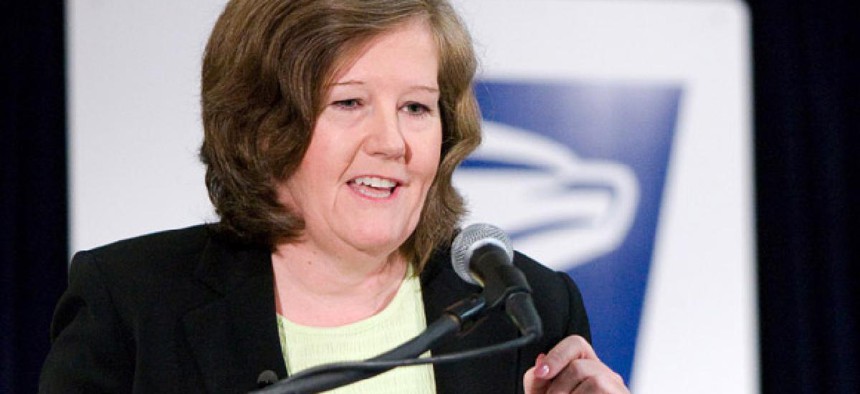
Megan Brennan, USPS chief operating officer, says rural post offices will not be closed without 'a viable solution.' USPS
Keep rural post offices open, but cut employee hours and benefits, USPS says
Postal Service changes course on closures and offers new early-out incentive.
The U.S. Postal Service announced plans Wednesday to reduce operating hours to enable it to keep open rural post offices previously slated for closure -- a sharp change of course for the cash-strapped agency.
“We will not close any of these rural post offices without having provided a viable solution,” said Megan Brennan, USPS chief operating officer. The agency announced in July 2011 that it would study 3,700 post offices for possible closure. Under the new strategy, it will review an additional 13,000 post offices for potential cost- saving options other than closure.
USPS pledged to continue holding community meetings in rural areas to gather input on which USPS-proposed cost saving options could work for them: contracting with local businesses to set up rural post offices, consolidating with nearby post offices or reducing the operating hours to better match customer use -- the option USPS says is most favored by 54 percent of the rural post offices it reviewed.
The new strategy would be phased in over two years; USPS anticipates saving $500 million a year from it. Although 4,500 rural post offices have been identified as exempt from hour and labor reductions, as many as 9,000 could remain open only two to four hours a day and an additional 4,000 could be cut back to a six-hour workday. Postmasters at reduced-hour locations switch to part-time work, with reduced or no benefits.
Postmaster General Patrick Donahoe said switching workers from full- to part-time work would generate most of the $500 million in identified savings.
“This is a win-win,” Donahoe said. “People said to us, ‘keep our post office open.’ If we shrink labor costs, we can keep it open.”
The agency also is offering a new $20,000 early-out incentive to full-time career postmasters, who would receive half their payment at the end of 2012 and the other half the following year. Donahoe said the reduced hours proposal was not eligible for union negotiations, but USPS would work with affected employees interested in other opportunities within the Postal Service, such as becoming a letter carrier.
USPS will file the strategy with the Postal Regulatory Commission by the end of May, and there will be no changes in service until after the filing. The agency will still go forward with its plan to consolidate more than 200 mail processing facilities.
Some of the agency’s requests for reform are still hamstrung by a divided Congress. The bill that passed in the Senate in April does not favor closing post offices to save money. Co-sponsor of that legislation, Sen. Tom Carper, D-Del., called USPS’ new plan a “stopgap, piecemeal measure.”
“This plan does not address some serious issues that continue to drain the Postal Service’s finances every day, including its costly retiree health care payments and past overpayments to the Federal Employee Retirement System -- which total nearly $11 billion,” Carper said in a statement Wednesday. “Moreover, this solution doesn’t go far enough to encourage a responsible reduction in its workforce.”
The House has yet to begin debate on its USPS reform bill, which advocates deeper cuts and post office consolidations and closures. “To achieve real savings creating long-term solvency, the Postal Service needs to focus on consolidation in more populated areas where the greatest opportunities for cost reduction exist,” Rep. Darrell Issa, R-Calif., the chief architect of the House bill, said in a statement Wednesday.
“The smallest 10,000 post offices collectively cost USPS less than $600 million to operate each year. That is less than one-eighth of the $5 billion USPS spends each year to operate its network of 32,000 post offices,” he added.






